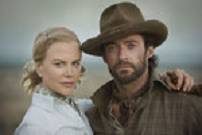|
|
||||
|
|
by John P. McCarthy  Anyone craving a wide-screen romantic epic need look no further than Australia, Baz Luhrmann's old-school fantasia about his homeland. This throwback to a noble cinematic tradition has no shortage of flaws. Overlong and ungainly in spots, the movie implores viewers to let their guard down and go with it, ultimately rewarding charity and forbearance with a cascade of emotions only an ambitious project can deliver. Fellow Aussies Nicole Kidman and Hugh Jackman limn the main protagonists, yet thirteen-year-old Brandon Walters provides the heart and soul of the picture as a half-Caucasian, half-Aboriginal lad named Nullah who links indigenous tradition with the European cultures that invented celluloid storytelling (among many other things, positive and pernicious). One ought to expect plush and sensual theatricality. Baz gets his Aboriginal on, much as he got his French on in Moulin Rouge! Blending high melodrama, rousing action, and native mysticism, Australia is a big-hearted homage to all his compatriots, the mode of filmmaking epitomized by Gone with the Wind, and the transformative imagination celebrated in The Wizard of Oz -- a movie incorporated into the plot for valid reasons and with salubrious effect. At the outset, title cards introduce the overarching theme of race and identity by referencing "The Stolen Generation" -- children with one white and one Aboriginal parent whom the government separated from their families and forced into lives of domestic service. The action commences in 1939 in the northwest of the country on a vast cattle station called Faraway Downs, owned by a British aristocrat. Kidman's Lady Ashley soon arrives with the intention of getting her husband to sell the property but is bewitched by the terrain, its indigenous people, and Jackman's freelance cowboy -- a strapping hunk called The Drover. She gets The Drover and a makeshift crew that includes Nullah to help her break the monopoly of cattle baron King Carney. Under the spiritual protection of Nullah's grandfather (David Gulpilil), they attempt to drive fifteen-hundred head of "cheeky bulls" to the port city of Darwin. The villain is Carney's right-hand weasel Fletcher (David Wenham), who tries to derail the drive during some thrilling if heavily digitized action sequences. The movie's middle portion takes place in Darwin as Lady Ashley -- "Mrs. Boss" to Nullah -- and The Drover get passionate and ruffle society at a charity ball, prior to returning to Faraway Downs for the rainy season. Their idyll ends when the rains cease and he agrees to round up cattle for the army and Nullah's grandfather urges the boy to go on his coming-of-age walkabout. With World War II about to erupt in the Pacific theater, the action switches back to Darwin, which the Japanese bomb following their attack on Pearl Harbor. During the anticipatory evacuation of the city, Catholic priests take mixed-race children to an island off the harbor and directly into harm's way. Australia finally climaxes after the city is decimated during stirring scenes reminiscent of the burning of Atlanta in Gone with the Wind. Australia can be picked apart. It's truncated in places, elongated in others and it's easy to see where it has been patched up in the editing room. But more of it works than doesn't, and extra points ought to be awarded for the creative and logistical effort. Kidman's performance during the initial hour or so is atrocious. Yet she settles down and is fine when springing into action, into bed with The Drover, or into maternal mode. Plus she looks fantastic in the costumes and she and Jackman certainly click. With Jackman mainly functioning as a he-man sex object -- his chest hair being a conspicuous metaphor for the country -- young Walters is the acting standout. Quibble with certain details and take advantage of the passages seemingly designed for bathroom breaks or trips to the concession stand. But allow yourself to be swept up by Australia. Appreciate Luhrmann's love of the medium, his understanding of its sensual power, and his sincere and generous compulsion to explore its perennial themes. As Nullah declares in his fractured English, "Why we tell story is most important of all. That's how you keep people belonging always." (Released by 20th Century Fox and rated “PG-13” for some violence, a scene of sensuality, and brief strong language.) |
||
|
© 2026 - ReelTalk Movie Reviews Website designed by Dot Pitch Studios, LLC |



